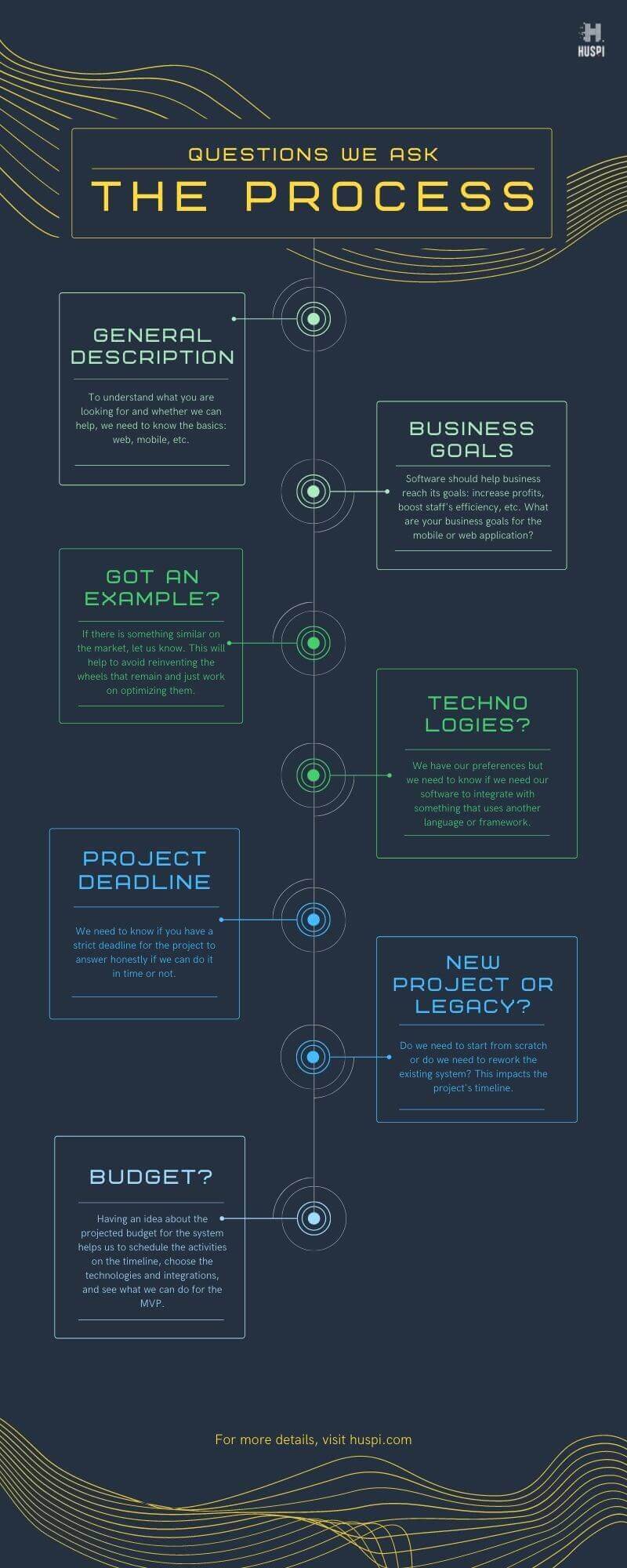If you have ever sent a request to an outsourcing company, chances are you received a list of questions about your idea from the company’s project managers or sales representatives.

Learn why it is important to know technical details about your software product idea and how it affects the overall price of the development.
Get a free guide!
In this article, we’ll talk about the questions we ask our clients prior to creating the rough estimation. We’ll also touch upon the reasons why we ask each question (hint: it’s not because we are just being nosy. Neither they are the hoops we want you to jump through just for us to see you do it.)
What Kind of Project Do You Want?
Even if you don’t answer any of the following questions, this question – “What kind of project do you want?” is the main one you need to answer if you want us to calculate the This is a general question about the project.
- Is it an app? (Native or cross-platform? Do you have a preference?)
- Is it a website? (Does it need an admin dashboard or is it a landing page?)
- Is it an integrated web and mobile system?
Read here a recent 2024 research on app development trends.
If you want a mobile app, think of these questions:
We’ll stop at some questions more specifically later in the article, but here are the things you should be able to answer (even just to yourself):
- What is the purpose of your mobile app?
- Who is your target audience or user base?
- Which platforms do you want your app to be developed for (e.g., iOS, Android, both)?
- What specific features and functionalities do you envision for your app?
- Are there any existing apps or websites that inspire you or are similar to your concept?
- Do you have any design preferences or branding guidelines?
- Do you require any backend infrastructure or API integrations?
- What is your desired timeline for app development and launch?
- What is your estimated budget for the project?
- Are there any specific security or privacy considerations for your app?
- Do you have any preference for the development methodology or project management approach?
- Will you require ongoing app maintenance and support after the initial development?
- Do you have any in-house development resources or technical expertise?
- Are there any specific legal or regulatory requirements you need to consider?
- Do you have a monetization strategy or plans for generating revenue from your app?
If you want a web-based app, think of these questions:
Some questions are general for all kinds of software – web or mobile-based, but you need to be able to answer these questions in order for us to know what to expect and how to better tailor the solution to your particular business requirements and expectations.
- What is the purpose of your web-based software?
- Who will be the primary users or target audience?
- What specific features and functionalities do you require in the software?
- Are there any existing software or websites that serve as a reference or inspiration for your project?
- Do you have any design preferences or branding guidelines for the software?
- What technologies or programming languages do you prefer for development?
- Are there any specific integrations or APIs that need to be incorporated into the software?
- Do you have any security or data privacy requirements for the software? (For example, if this is an e-health app or one that handles personal and financial data.)
- What is your desired timeline for development and deployment?
- What is your estimated budget for the project?
- Will the software require ongoing maintenance and support after the initial development phase?
- Do you have any in-house technical resources or expertise available for the project?
- Are there any legal or regulatory considerations that need to be addressed?
- Do you have a monetization strategy or plans for generating revenue from the software?
- Will the software need to be accessible across different devices and browsers?
Tell us about your project – anything you consider important. Communication is key.
What Are the Business Goals and Purposes of the App?
The goal and the purpose of the mobile app or a web-based application are the critical questions that you need to know the answer to.
Millions of apps are available on the market, and simply copying something already isn’t a good idea. However, if you have come up with a new solution to an existing challenge, that’s great! That’s what we want to know – why did you decide to create an app or website? What do you expect it to do? How do you envision it reaching its goal?
Business goals are also an important part of understanding and building a software solution. For example, knowing that you would like to use this app or web application to increase your profits by 25% or clients by 10% will help us remain focused on reaching that goal. Otherwise, we might create a solution that will meet all the technical requirements but might not solve the original issue. We’ll “win the battle, but lose the war.”
The more precise your definition, the better and simpler will be for us to understand what’s required and what technologies we’ll need for those tasks. For example, “I want an app for restaurants” is quite broad and vague. However, when you talk about “An app where clients can see the restaurant’s menu, order food, and pay for it, as well as a backend system for administrators to manage the orders,” our PMs can already start envisioning the system’s architecture.
Are There Any Examples of Similar Apps or Systems?
There are times when you use an app or a system and you think “Dang, everything’s great, except that one thing or one scenario. It would be perfect for a shopping app to have an option with a speech-to-text feature for grocery lists. I need an app like that.”
If you tell us “Here’s a similar app I liked but I want it for another purpose,” this will also give us valuable information about the system architecture and what you want to see as the final product. We can reinvent the wheel, but at the same time, there’s no need to reinvent it just to change the tire pattern.
And if it’s a brand new idea the market hasn’t seen yet – well, great! Let’s do it!
Do You Have Any Preference for the Technologies?
At HUSPI, our standard technologies are based on JavaScript (React for the front end and Node.js for the back end, most of the time). However, the tools should be chosen based on the requirements and documentation.
If you have an existing system and you want additional modules for it, the solution should integrate with it seamlessly. If your system uses PHP, for example, we’ll need to make sure that everything works correctly (given the systems will work together.)
If you don’t have any preference and it’s a brand new project, then our PMs and developers can brainstorm on the best-fitting solution that would suit your needs and use the strengths and experience of our team.
What Is Your Project Deadline?
Some sales representatives might tell you that it’s possible to create an app within two weeks. However, chances are that the app will not meet your requirements (except the deadline.)
As a rough estimate, developing a basic MVP for a mobile or web app typically takes anywhere from 2 to 6 months. This timeframe includes initial planning, requirement gathering, design, development, testing, and deployment. Keep in mind that this estimate is for a basic MVP, which typically focuses on delivering core functionality and may lack some advanced features or extensive polish.
Therefore, it’s important to:
- Plan and be realistic.
- Realize that good things take time (and no, we don’t just say that because we get paid per hour.)
Most of the time, you’ll need around 3 months for a good-quality MVP. However, based on your goals and plans, there is always a way out even when the deadlines are very tight.
For example, do you need to pitch a project to your investor in two weeks? We won’t be able to have a product ready in that time, but we can create a prototype, which will show the advantages of the solution. Other things that can be done in a relatively short period are the project development plan, design, etc.
Is This a New Project or Do You Have an MVP Already?
Do we need to start from scratch or do we need to rework the existing system? Counterintuitively, it’s often (not always) faster to create something from scratch than to dig through the legacy code to understand the project’s architecture. A side question to this one is – do you need to create a standalone product or a module for the existing system? We mentioned this briefly in the question about the technologies, but it’s an important piece of information that will help us make decisions regarding the languages and databases used.
The time required for updating existing software versus creating something from scratch can vary depending on several factors. Let’s consider both scenarios:
Updating Existing Software:
- Scope of Changes: The extent of changes required in the existing software plays a significant role. If the updates involve minor bug fixes or small feature enhancements, the time required may be relatively shorter. On the other hand, if the updates involve significant architectural changes, integration of new functionalities, or major design overhauls, the time required will be longer.
- Codebase Familiarity: The familiarity of the development team with the existing codebase is crucial. If the team has prior experience and understanding of the codebase, it can expedite the update process. Conversely, if the codebase is complex or poorly documented, it may take longer to make updates.
- Testing and Compatibility: Updating existing software requires thorough testing to ensure that the changes do not introduce new bugs or affect existing functionalities. Compatibility with different platforms, devices, or integrations may also need to be considered.
Creating Something from Scratch:
- Planning and Design: When starting from scratch, planning and designing the software architecture, user interface, and feature set are essential. This process can take time, particularly if there are complex requirements or a need for extensive user research.
- Development: Developing a software product from scratch involves building the entire codebase, implementing features, and integrating necessary components. The time required will depend on the complexity and scale of the project.
- Testing and Iteration: Rigorous testing and iteration are necessary during the development process to ensure quality and address any issues. This iterative cycle can add time to the development timeline.
In general, updating existing software may require less time compared to creating something from scratch, especially if the updates are relatively straightforward. However, significant updates or changes can also take considerable time, potentially rivaling or surpassing the time required to develop a new software product from scratch.
What is MVP? We wrote about this approach to development and the benefits of MVP for new software products.
What Kind of Budget Could We Expect to Work with for This Project?
Yes, we realize that oftentimes this question sounds too upfront. However, one of the reasons we ask is because having an idea about the projected budget for the system helps us to schedule the activities on the timeline, choose the technologies and integrations, and see what we can do for the MVP.
At HUSPI, we don’t work for stockholders’ equity in the project. It might be a good option for larger companies that are searching for startups to invest in and we’re steadily growing toward that goal. Nevertheless, at the present moment, this business model is not one of ours.
We wrote about our estimation process and inception phase process.
Project Management Questions: Infographic

Ready to answer those questions? Let’s meet!
It might seem like we want a lot of information, but if you think about it – you probably have all the answers to the questions we’ve asked. Our final goal is to create an application for you that will ultimately help your business grow and prosper. We love the success stories of our clients, especially when we have helped along the way.
Got all the answers? Let’s connect for a meeting.
Wondering about time-to-value?
Request a no-obligation discovery call and receive a preliminary estimate tailored to your KPIs.


